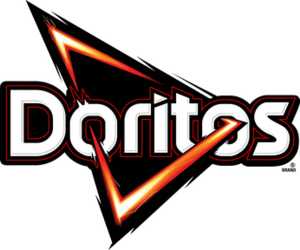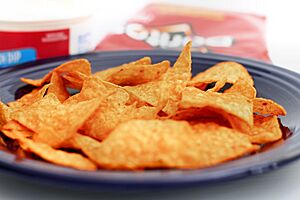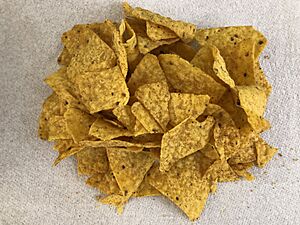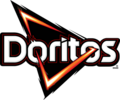Doritos facts for kids
 |
|

The current Doritos logo (top); Nacho Cheese Doritos (bottom).
|
|
| Type | Tortilla chip |
|---|---|
| Owner | PepsiCo (via Frito-Lay) |
| Country | United States |
| Introduced | 1964 (nationwide in 1966) |
| Related brands |
|
| Markets | International |
| Tagline | "Another Level" |
Doritos are a popular brand of flavored tortilla chips. They are made by Frito-Lay, which is a company owned by PepsiCo. The idea for Doritos first came from a restaurant at Disneyland.
In 1966, Doritos became the first tortilla chip sold all across the United States. The first flavor was just toasted corn. Later, taco flavor came out in 1967, and the famous nacho cheese flavor in 1972. Today, you can find Doritos all over the world. They come in many different flavors, which can be different depending on the country.
Doritos are also well-known for their fun advertising. This includes commercials shown during the Super Bowl. The Doritos brand is also used for other snacks, like Doritos 3D and taco shells at Taco Bell.
Contents
The Story of Doritos
The name Dorito comes from a Spanish word, doradito. This means "little fried and golden thing."
The first Doritos were made at a restaurant called Casa de Fritos in Disneyland. This happened in the early 1960s. The restaurant used leftover tortillas, cut them into small pieces, fried them, and added simple seasoning. Arch West, who worked for Frito-Lay, saw how popular they were.
In 1964, Frito-Lay started making the chips themselves. Doritos were then sold across the country in 1966. This made them the first tortilla chip to be sold everywhere in the United States.
In 1994, Doritos changed their design. This was a big and expensive change for Frito-Lay. They spent $50 million to make the chips better. The new chips were 20% bigger and 15% thinner. They also had rounded corners, which made them easier to eat. Each chip also got more seasoning for a stronger taste. These new chips came out in early 1995.
In 2002, Frito-Lay removed trans fat from all Doritos in the United States. In 2006, Doritos launched new flavors and a new look. This was a big change for the brand. On February 21, 2013, the Doritos logo changed again. Their new advertising slogan became "for the bold."
In 2015, Doritos made special Rainbow Doritos. These were sold to help the It Gets Better Project. This group supports young people in the LGBT community. The sale raised $100,000 for the organization.
What's in Doritos?
The original plain Doritos (called 'Lightly Salted' in the UK) are made from ground corn, vegetable oil, and salt. Other flavors have different ingredients. Doritos made for the US market usually do not use animal products from pork in their cheese flavorings.
For example, Nacho Cheese Doritos in the U.S. contain ingredients like whole corn, vegetable oil, salt, cheddar cheese, and many flavorings. Some of these flavorings include monosodium glutamate (MSG) and different colors.
Some people have wondered if the oils and additives in Doritos are healthy.
Doritos Flavors
Doritos are sold in many countries with lots of different flavors. When they first came out in the U.S. in 1966, there was only one flavor: Toasted Corn. People outside the Southwest thought this flavor was too plain. So, Frito-Lay created taco-flavored Doritos, which became popular in 1967.
Nacho cheese-flavored Doritos started selling everywhere in 1972 and were also a big hit. In 1986, Cool Ranch Doritos came out and became very popular. In the UK, Cool Ranch Doritos are called "Cool Original." In other parts of Europe, they are called "Cool American."
In the 1990s, Doritos introduced flavors like Taco Supreme (from Taco Bell) and Pizza Cravers (from Pizza Hut). After PepsiCo sold its restaurant businesses, these flavors were just called taco and pizza.
In 2004, Doritos made a new shape called "Rollitos." These were corn chips shaped like small tubes. Flavors included Nacho Cheesier and Cooler Ranch. In 2013, this idea came back as "Dinamitas." These are rolled Doritos that come in flavors like chili lime.
Doritos has also made "Doritos Collisions." These bags have two different flavors mixed together. Some combinations included Hot Wings/Blue Cheese and Zesty Taco/Chipotle Ranch.
In 2007, Doritos had a "Flavor Experiment." They sold black bags of Doritos with an unknown flavor. People had to guess the flavor and name it. The flavor was called "All American Classic."
In 2008, Doritos had another "mystery flavor" contest. The mystery flavor turned out to be Mountain Dew. In 2009, they released "Doritos Late Night" flavors like "Tacos at Midnight."
In 2010, Doritos came to New Zealand. Flavors there included Nacho Cheese and Cheese Supreme. In 2011, a Tapatio hot sauce flavor was released in the U.S.
In 2015, Doritos Roulette was released for a short time. All the chips looked the same, but one out of every six chips was extra spicy. This flavor returned to stores on April 12, 2021.
On October 6, 2022, Doritos launched two new flavors in the UK. These were inspired by popular pizzas: Triple Cheese Pizza and Loaded Pepperoni Pizza.
As of November 2014, some flavors in Canada included Nacho Cheese, Cool Ranch, and Sweet Chili Heat. In the U.S., popular flavors include Roasted Corn, Tapatio Hot Sauce, and Salsa Verde.
In January 2017, Doritos entered the Indonesian market. Flavors there included Nacho Cheese and Barbecue. In September 2021, Doritos made in Indonesia were renamed Maxicorn. However, in March 2025, Doritos were brought back to Indonesia. They are now made locally and come in Roasted Corn and Salsa flavors.
Doritos Marketing
Doritos has had many advertising campaigns. These include TV commercials with famous people like Avery Schreiber and Ali Landry. They also appeared in movies like Wayne's World.
Super Bowl Ads
For many years, Doritos has advertised a lot during the Super Bowl. In 1998, Doritos featured former Miss USA Ali Landry in a Super Bowl commercial. She became known as "The Doritos Girl" because the ad was so popular.
For Super Bowl XLI in 2007, Doritos started a contest called "Crash the Super Bowl." This allowed regular people to create their own Doritos commercials. The public voted for their favorite. The vote was so close that Doritos decided to show two ads instead of one. Both commercials were very popular.
For Super Bowl XLIII in 2009, Doritos again let fans create commercials. The winning ad was called "Free Doritos." It showed an office worker using a snow globe to "predict" free Doritos for everyone. This commercial was named the best ad of the year by USA Today. The creators won a $1 million prize.
For Super Bowl XLIV in 2010, four fan-made ads were entered. If three of them won the top spots, the creators would share $5 million.
For Super Bowl XLVI in 2012, an ad showed a grandma and a baby trying to get Doritos with a slingshot. For Super Bowl XLIX in 2015, an ad showed a father giving his son Doritos after the son made pigs fly.
Other Marketing Efforts
In 2008, Doritos launched an "out-of-this-world" ad campaign. They actually sent a 30-second Doritos commercial into space! It was beamed towards a star system 42 light years away.
Doritos was the main sponsor for the Wolverhampton Wanderers football team in 2002/03 and 2003/04.
In 2010, Doritos Canada held a "Viralocity" contest. People were asked to name a new flavor and make an online video ad for it.
On September 20, 2011, Arch West, who helped create Doritos, passed away at age 97. He is remembered for making Doritos the first national tortilla chip brand.
To celebrate Taco Bell's 50th anniversary, Doritos and Taco Bell teamed up. They created the Doritos Locos Tacos, which came out on March 8, 2012. These tacos have a shell made from Nacho Cheese Doritos.
In March 2012, a new line of Doritos called Doritos Jacked was introduced. These chips are 40% larger than regular Doritos.
In March 2013, Doritos changed its packaging and logo. This was part of its first worldwide marketing campaign, called "For the Bold." This campaign focuses on consumers who "live for the moment."
In July 2014, 7-11 stores released a new snack called Doritos Loaded. This was a breaded cheese snack.
Doritos 3D
Doritos 3D are puffed Doritos that first came out in 1998. They were stopped in the United States in 2004. People described them as a mix of "Doritos-meets-Bugles." Flavors included Jalapeño Cheddar and Nacho Cheese. Doritos 3D are still sold in Mexico. On December 21, 2020, it was announced that Doritos 3D would return to stores on December 28. They are now available in Chili Cheese Nacho and Spicy Ranch flavors.
Images for kids
See also
 In Spanish: Doritos para niños
In Spanish: Doritos para niños
 | Percy Lavon Julian |
 | Katherine Johnson |
 | George Washington Carver |
 | Annie Easley |




